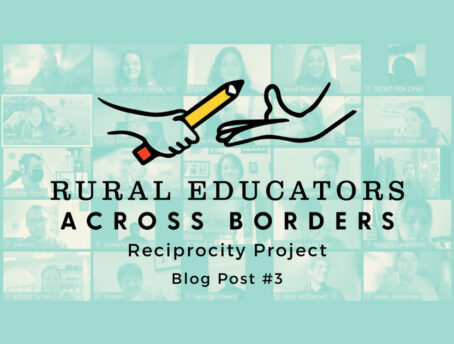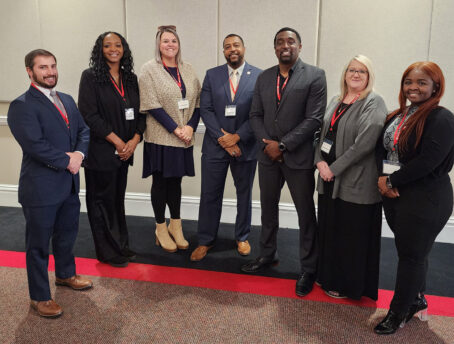Welcome to our fifth episode of the I Am a Rural Teacher Podcast! This week we're talking with Sharon Laredo Christie, a third-year teacher in the border town of Douglas, Arizona. You can listen to the podcast here, or read the story below.
You can also find our podcast on Apple Podcasts, Stitcher, Google Podcasts and Spotify. Our last episode will be released next Monday.
This year has been strange for even the most experienced teachers. But this is only Sharon Laredo Christie’s 3rd year of teaching - and she has been at a different school for each one.
Teaching is actually a second career for Sharon.
"I used to be a correction officer. I worked at the prison and, I was happy there as well, but since I was a little kid, I wanted to be a teacher. I just, it's wonderful."
She says one of the main reasons she ended up becoming a teacher is because of her father. He was a teacher for over 50 years on the other side of the border in Mexico, just blocks away from where Sharon teaches now.
"And so he's one of my greatest inspirations. So I said, 'Oh, wouldn't that be neat if his daughter could teach on this side? That would be amazing.'"
Sharon teaches in Douglas, Arizona, a town right on the US Mexico border in the Southeast corner of the state. It’s not always easy to live here, she says, but it's home. Before she moved back, she said the border was calling her.
"It's actually considered a great honor to live on the border. It's not, maybe, the most beautiful town. Neither Agua Prieta or Douglas are beautiful towns. But the culture here is just, I don't know what it is..."
Douglas was booming, she says, when smelting was in town - that's a process of applying heat to ore in order to extract a base metal.
But when that industry left, the local economy collapsed. Now Sharon says you either work for the prison, the border or the schools here.
"People see it as a dying town. I see it as a town with a lot of potential, but there's not much here."
It's interesting to see Douglas juxtaposed next to the town on the other side of the border - Agua Prieta. If you head to google maps you can physically see it, the city grid is much denser on the Mexico side. The population there is almost 4 times that of Douglas.
"People think it's weird when I tell them there's parts in Agua Prieta I've never been in because it just grew and grew and grew, the town I live in. There's parts of it, I've never been there."
Sharon says for all of her students, English is a second language, and many actually live in Mexico and commute across the border to her school. Families keep one home in Mexico and one home in the US and have dual citizenship.
But it's her goal, she says, that after the pandemic is done to go to Aqua Prieta, partner with teachers there and do research on how they teach and learn, and implement some of those practices into her lessons here in the US.
As the COVID-19 pandemic continues to keep classes online, Sharon has been yearning for the old days. Even for her, the endless virtual learning gets boring, and she misses the human connection of a bustling school.
"They'll use the WhatsApp app and they'll send me, for example. Let me see if I can show it to you. So they'll show me, they'll say, miss, look, this is a picture of my dog. So they send me pictures or they'll show you. This is what I ate today. But I miss them telling me in person, seeing them in the hallway. That you cannot get from Google Meet."
But Sharon says they are doing their best to still cultivate those connections.
"I know some of them. Their parents or I went to school with, because I'm like, 'Oh, I saw your last name.' And they're like, 'I think you went to school with my dad.' Or 'I think you went to school with my granddad.' I'm like, okay. Or my dad was their grandparent's teacher or something like that. And so we make connections, because the good thing about a small town it's easily more easy to make connections, or they'll say, 'Where did you live? I live here.' I said, 'Oh, I live here.' 'Oh, that's where my Tio is.' So it's easier to make those connections, but otherwise I have tried to make connections through Google Meet."
It was her dad who really instilled this devotion - to the craft and to her students - in her.
"I don't know how this man did it, but he always had time for our family. But also at the same time, he was always working in school. So I would always see him late at night preparing his lessons and then the way he did, talk about his students, that devotion, it was incredible. And he remember his students from 30, 40 years back."
Like Jolene in our first episode, Sharon sees education as a way out for students. With an education, she says, you can have a better job and a good, honest life for you and your family.
She says there is a pull for kids to do bad things here, but SO much of the conversation about the border is about drug trafficking…
"You can hear bad stuff about drug trafficking on the border, which is a reality for us. But maybe you don't hear that much about the good things that happen here. The strong sense of community there. Strong sense of unity of family."
But she likes teaching here, she can relate to students. She was born in Douglas, grew up in Agua Prieta, and has been back living in Douglass since 2006.
"Sometimes my students, they kind of get embarrassed about that reading, or can you read this PowerPoint for me or I cannot pronounce this word. And I said, 'Why? It's hard for me to pronounce that word too.' And they feel more comfortable with it, you know? Or, maybe if they live across the border, a lot of them do, or they have told me, 'When we’re in real life, sometimes I can’t make it to class on time', and I also understand. In Mexico, we do not have what the U.S. has, so many of their parents maybe don't have a job.
And so I know I can understand what problems they are going through. Maybe they don't have enough money at their home. Even though I'm so much older than them, probably old enough to be their grandmother, I can understand. I guess they can understand me too."
As she continues these early years in her own teaching career, Sharon's message to other new rural teachers is that it's hard, it is a lot of work, but it's worth it. It can be joyous and it can be heartbreaking, but she only wishes she had became a teacher sooner.
"And I just want to let you know that teaching is such a beautiful profession and, I think more people should look into it. It's just a truly rewarding thing to do."
The 'I Am a Rural Teacher' Podcast is part of a national advocacy campaign from the Rural Schools Collaborative and is in partnership with the National Rural Education Association and the Community Foundation of the Ozarks. The project is supported by The Bill & Melinda Gates Foundation.




